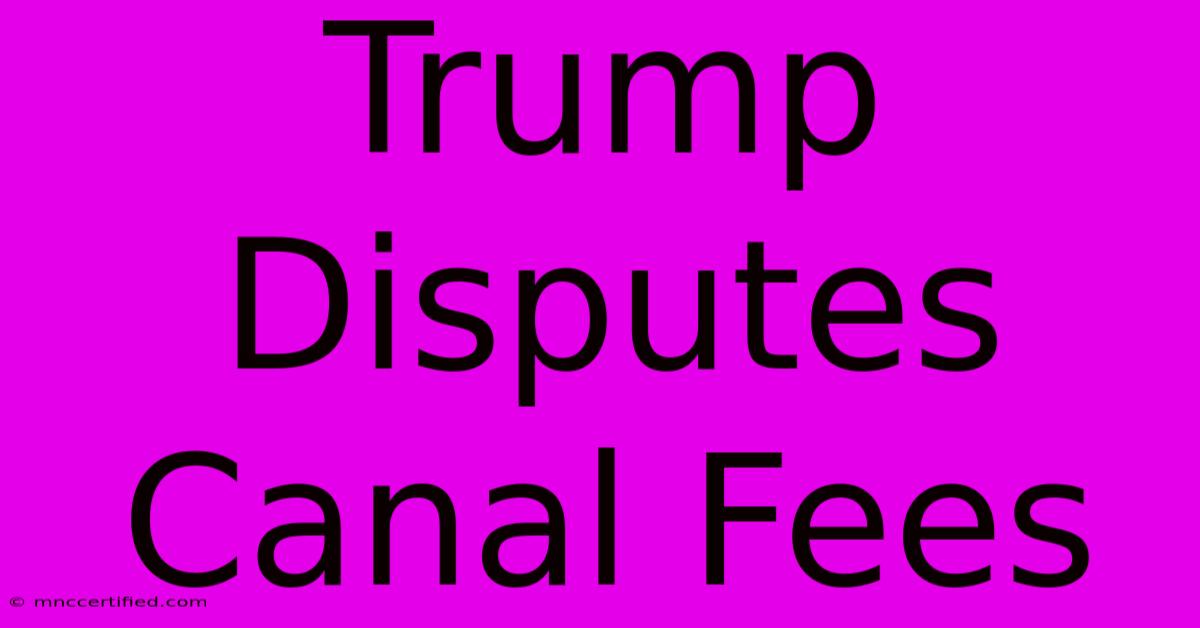Trump Disputes Canal Fees

Table of Contents
Trump Disputes Canal Fees: A Deep Dive into the Controversy
Donald Trump's presidency was marked by numerous controversies, and his disputes regarding Panama Canal fees are no exception. This article delves into the intricacies of the conflict, exploring the underlying issues, the key players involved, and the lasting implications of this significant disagreement.
Understanding the Panama Canal Fee Dispute
The core of the dispute revolved around the fees charged by the Panama Canal Authority (ACP) for the transit of vessels, particularly large container ships. During the Trump administration, claims emerged alleging that the fees were unfairly high, placing American businesses at a disadvantage compared to their international competitors. These claims sparked a significant debate, with the Trump administration suggesting the fees were excessively burdensome and hindering US economic competitiveness.
Key Arguments Presented by the Trump Administration
The Trump administration's arguments against the Panama Canal fees centered on several key points:
- Unfair Competition: The administration argued that the fees levied by the ACP disproportionately affected US businesses, creating an uneven playing field with competitors from other nations. This was a significant concern for industries heavily reliant on Panama Canal transit, such as agriculture and manufacturing.
- Economic Burden: High canal fees, according to the Trump administration, added to the overall cost of goods, impacting American consumers and businesses alike. This economic burden was cited as a crucial factor contributing to the administration's dissatisfaction.
- Negotiating Power: The administration believed that the US held sufficient leverage to negotiate lower fees, reflecting its significant role in the canal's operation and global trade. This view underscored a perceived imbalance in the negotiating power between the US and the ACP.
The Panama Canal Authority's Counterarguments
The ACP, on the other hand, maintained that its fee structure was transparent, fair, and essential for maintaining the canal's infrastructure and operational efficiency. Their counterarguments included:
- Cost Recovery: The ACP argued that the fees were necessary to cover the substantial costs associated with maintaining and upgrading the canal's infrastructure, ensuring its long-term viability.
- Global Competitiveness: The ACP emphasized that its fee structure was competitive with other major shipping routes, suggesting that the US concerns were overstated.
- Treaty Obligations: The ACP highlighted the existing treaties and agreements governing the operation of the canal, asserting that its fee structure adhered to all applicable legal frameworks.
The Players Involved and Their Influence
The Panama Canal fee dispute involved a complex interplay of actors, each wielding influence over the outcome:
- The Trump Administration: The administration spearheaded the challenge, leveraging its diplomatic and economic power to attempt a renegotiation of fees.
- The Panama Canal Authority (ACP): The ACP defended its fee structure and negotiated with the US government, maintaining its position based on financial and legal grounds.
- US Businesses: American businesses utilizing the canal were directly impacted by the fees, influencing the administration's stance and lobbying efforts.
- International Shipping Companies: Global shipping companies were also stakeholders, as their operational costs were directly affected by the canal fees.
Long-Term Implications and Lasting Effects
The Trump administration's dispute over Panama Canal fees had several lasting implications:
- Strained US-Panama Relations: While the dispute did not severely damage the overall relationship, it introduced tensions that required careful diplomatic management.
- Review of Canal Fee Structures: The controversy prompted a review of the fee structure's fairness and transparency, potentially leading to future adjustments.
- Increased Scrutiny of Global Trade: The debate highlighted the complexities of global trade and the challenges of ensuring fair competition in international shipping.
Conclusion: An Ongoing Debate
The Panama Canal fee dispute remains a significant issue, reflecting the broader challenges of international trade, economic competition, and diplomatic relations. While the Trump administration's direct involvement ended with his departure from office, the underlying issues continue to be debated and negotiated. Future discussions will need to address the concerns raised while acknowledging the ACP's need to maintain the canal's operational efficiency and financial sustainability. Further research into the specific data surrounding canal usage and fee structures would offer a more complete understanding of the ongoing debate.

Thank you for visiting our website wich cover about Trump Disputes Canal Fees. We hope the information provided has been useful to you. Feel free to contact us if you have any questions or need further assistance. See you next time and dont miss to bookmark.
Featured Posts
-
Nfl Recap Rams 19 Jets 9 12 22 24
Dec 23, 2024
-
Young Adults On Their Own Gift Lists
Dec 23, 2024
-
Lions Vs Bears Injury Report And Outlook
Dec 23, 2024
-
5 Things To Watch Lions At Bears Game
Dec 23, 2024
-
Eagles Lose 14 Hurts Injured
Dec 23, 2024